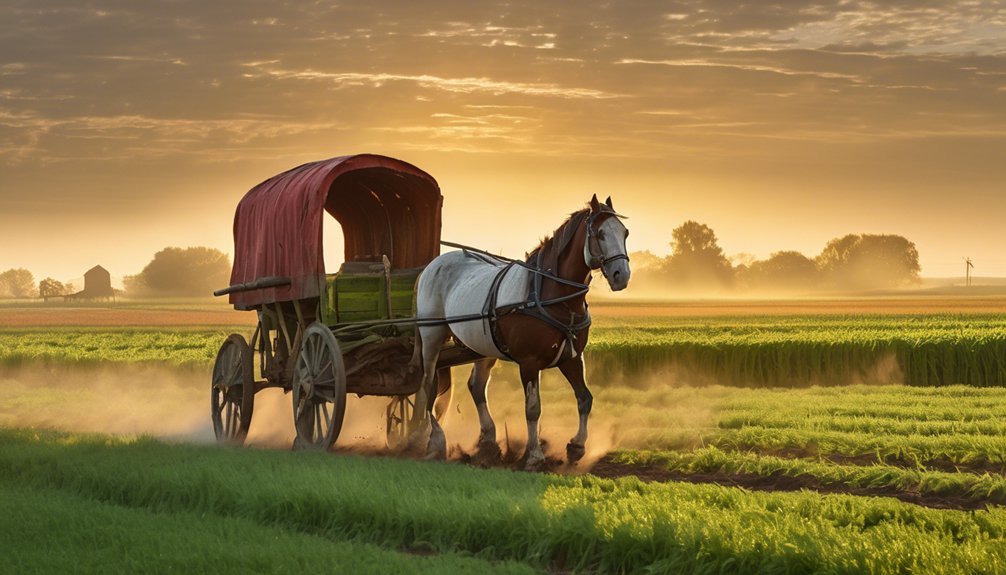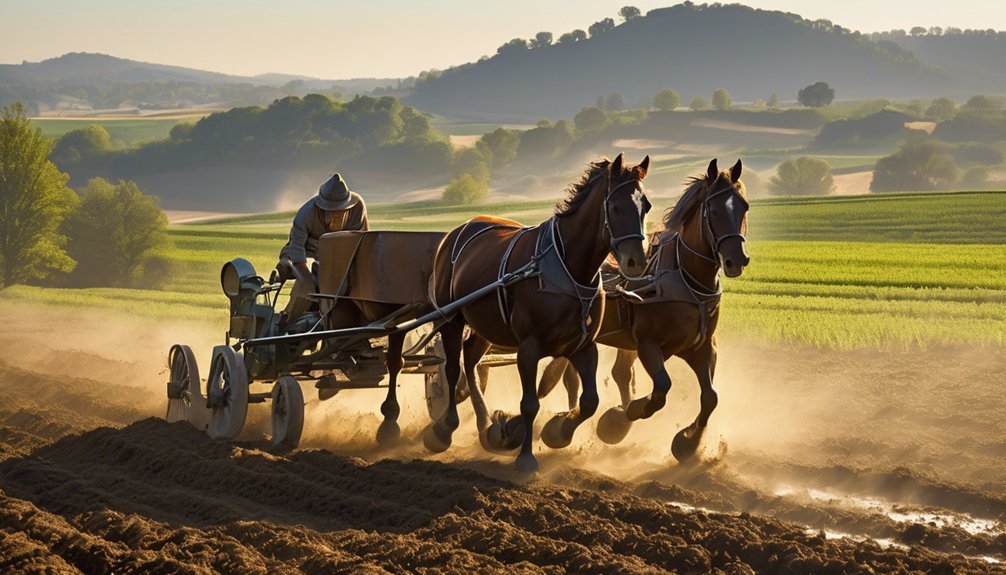
Horses have a significant yet often overlooked role in modern agriculture. You might not realize how their natural behaviors enhance soil health and promote sustainable practices. From aerating the ground with their hooves to serving as eco-friendly transportation, their contributions extend beyond mere labor. Plus, the bond between farmers and horses adds a layer of emotional support that can't be underestimated. What other unique ways do horses influence agricultural practices today?
Key Takeaways
- Horses enhance soil health through natural tilling, creating channels for air, water, and nutrients while minimizing compaction.
- They provide eco-friendly transportation and hauling solutions, reducing carbon footprints in agricultural logistics.
- Horses contribute to mental well-being for farmers, offering companionship and therapeutic benefits during demanding work.
- Their grazing helps with natural pest control and fertilization, promoting healthier crop management practices.
- Educational programs centered around horses foster community engagement and promote sustainable farming practices.
Enhancing Soil Health Through Natural Tilling

While many modern farming techniques prioritize machinery, you might be surprised to learn that horses can play a vital role in enhancing soil health through natural tilling.
By using horses for plowing, you not only achieve effective soil aeration but also minimize soil compaction. Their hooves create small channels in the earth, allowing air, water, and nutrients to penetrate deeper, fostering a healthier ecosystem.
Additionally, as horses graze, they contribute to natural fertilization through their manure, enriching the soil with essential nutrients. This organic approach helps maintain a balanced pH and encourages beneficial microbial activity.
Embracing horses in your farming practices not only honors tradition but also promotes sustainability, linking you to a more harmonious agricultural future.
Sustainable Transportation and Hauling
As you explore sustainable options for transportation and hauling in agriculture, consider the unique advantages that horses bring to the table.
Horse-drawn logistics offer an eco-friendly transport solution that minimizes carbon footprints while efficiently moving goods. With their ability to navigate diverse terrains, horses can reach areas where larger machinery might struggle, ensuring that you maintain productivity without compromising the environment.
Additionally, using horses fosters a deeper connection to the land and its resources, promoting a more holistic approach to farming. By incorporating horse-drawn methods into your agricultural practices, you're not only embracing tradition but also championing sustainability.
This choice can transform your logistics into a more responsible, efficient, and harmonious aspect of your farming operation.
Companionship and Mental Well-being for Farmers
When you consider the demanding nature of farming, it's clear that companionship can significantly enhance your mental well-being.
Horses offer more than just utility; they provide invaluable emotional support. Their presence can be a source of comfort, helping you feel less isolated during long, arduous days. Engaging with a horse fosters a bond that often translates into therapeutic benefits, reducing stress and anxiety.
You might find that grooming or riding becomes a meditative practice, allowing you to recharge mentally. These moments spent with your horse can truly uplift your spirit, reminding you of the joy and beauty in your work.
Ultimately, integrating horses into your daily routine not only enriches your farming experience but also nurtures your emotional health.
Integrating Horses in Modern Crop Management

Horses can play a transformative role in modern crop management, blending traditional practices with innovative approaches. By integrating horses into your farming routine, you can enhance efficiency while respecting the land.
Here are some ways to do it:
- Crop Rotation: Use horses for tilling and preparing soil, promoting healthier crop rotation without heavy machinery.
- Pest Control: Horses can help manage weeds and pests naturally, reducing the need for chemical interventions.
- Soil Aeration: Their hooves naturally aerate the soil, improving water retention and root health.
- Sustainable Transport: Utilize horses to transport supplies or harvests, minimizing your carbon footprint.
Incorporating horses not only improves your crop management but also deepens the bond between you and these magnificent animals.
Educational Opportunities and Community Engagement
While blending horses into modern agriculture offers numerous benefits, it also opens up a wealth of educational opportunities and avenues for community engagement.
You can participate in horse-based education programs that teach sustainable farming practices, animal care, and the history of equine contributions to agriculture. Community workshops often bring together local farmers, families, and enthusiasts, fostering a deeper connection to both horses and the land.
These gatherings encourage knowledge sharing and skill development, enhancing a sense of belonging. By engaging in these activities, you not only enrich your understanding but also contribute to a vibrant community culture.
Embracing horses in agriculture cultivates a unique bond between people, animals, and the environment, creating lasting impacts that resonate far beyond the farm.
Frequently Asked Questions
What Breeds of Horses Are Best for Agricultural Work?
When considering the best breeds for agricultural work, you can't go wrong with draft horses like Clydesdales or Percherons. These powerful work horses excel at heavy tasks, making your farming experience smoother and more efficient.
How Do Horses Compare to Machinery in Cost-Effectiveness?
When considering cost-effectiveness, you'll find horse maintenance costs can be lower than machinery depreciation rates. Horses require less upfront investment, but ongoing care and management are crucial for balancing overall expenses and productivity.
Can Horses Be Used in Organic Farming Practices?
Using horses in organic farming practices isn't just sustainable; it's like nurturing a bond with nature itself. Horse-drawn cultivation revitalizes soil health and enhances biodiversity, making your farm a thriving ecosystem full of life.
What Are the Health Benefits of Horse Ownership for Farmers?
Owning horses offers you stress relief and encourages physical fitness. Caring for them fosters a connection that can enhance mental well-being, making your daily routine more fulfilling while promoting a healthier lifestyle for you.
How Do I Train a Horse for Agricultural Tasks?
To train your horse for agricultural tasks, start with groundwork techniques to build trust and communication. Then, introduce harness training gradually, ensuring your horse feels comfortable and confident with the equipment before progressing to tasks.
Conclusion
Incorporating horses into modern agriculture isn't just about practicality; it's about cultivating a vibrant connection to the land. Picture a farmer, surrounded by the rhythmic sound of hoofbeats, as the gentle giants aerate the soil and graze peacefully, enriching the earth beneath them. This harmonious partnership not only boosts productivity but also nurtures the soul, reminding us that the bond between humans and horses can transform farming into a fulfilling journey of growth and well-being.





